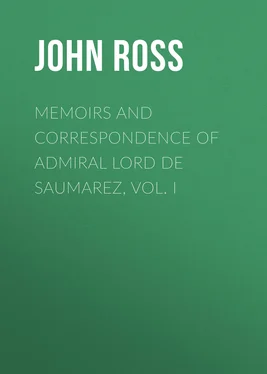John Ross - Memoirs and Correspondence of Admiral Lord de Saumarez, Vol. I
Здесь есть возможность читать онлайн «John Ross - Memoirs and Correspondence of Admiral Lord de Saumarez, Vol. I» — ознакомительный отрывок электронной книги совершенно бесплатно, а после прочтения отрывка купить полную версию. В некоторых случаях можно слушать аудио, скачать через торрент в формате fb2 и присутствует краткое содержание. Жанр: foreign_prose, foreign_antique, на английском языке. Описание произведения, (предисловие) а так же отзывы посетителей доступны на портале библиотеки ЛибКат.
- Название:Memoirs and Correspondence of Admiral Lord de Saumarez, Vol. I
- Автор:
- Жанр:
- Год:неизвестен
- ISBN:нет данных
- Рейтинг книги:3 / 5. Голосов: 1
-
Избранное:Добавить в избранное
- Отзывы:
-
Ваша оценка:
- 60
- 1
- 2
- 3
- 4
- 5
Memoirs and Correspondence of Admiral Lord de Saumarez, Vol. I: краткое содержание, описание и аннотация
Предлагаем к чтению аннотацию, описание, краткое содержание или предисловие (зависит от того, что написал сам автор книги «Memoirs and Correspondence of Admiral Lord de Saumarez, Vol. I»). Если вы не нашли необходимую информацию о книге — напишите в комментариях, мы постараемся отыскать её.
Memoirs and Correspondence of Admiral Lord de Saumarez, Vol. I — читать онлайн ознакомительный отрывок
Ниже представлен текст книги, разбитый по страницам. Система сохранения места последней прочитанной страницы, позволяет с удобством читать онлайн бесплатно книгу «Memoirs and Correspondence of Admiral Lord de Saumarez, Vol. I», без необходимости каждый раз заново искать на чём Вы остановились. Поставьте закладку, и сможете в любой момент перейти на страницу, на которой закончили чтение.
Интервал:
Закладка:
On the 9th of August 1769, the ship sailed for the Mediterranean. Great pains were taken by the captain to improve the talents of young Saumarez, which soon became apparent: but the commodore being obliged to return home on account of ill health, he placed him in the Winchelsea; and we find that he went on board the Pembroke, bearing the broad pendant of Commodore Proby, and commanded by Captain Durell, who was a relative of the family, on the 14th August 1770, and joined the former ship on the 28th September following.
Nature happily had endowed young Saumarez with talents, and qualities of mind and heart, which in a great measure repaired the want of a regular and more enlarged education: a sound judgment and quick sensibility soon led him to perceive his deficiency in acquired knowledge; and he was inspired with a laudable ambition, to remedy it by every exertion the feeble means within his reach could accomplish. When, indeed, it is considered that only a few volumes of the Spectator and Idler, with some stray volumes of the Roman History, composed his little library, it may justly be inferred that it was no ordinary capacity or moderate application which could form a character such as was manifested by him.
Frigates, in those days, had neither chaplains nor schoolmasters; and the "young gentlemen," when off duty, were left to spend their time as they thought fit. The midshipmen of the present day can have but a faint idea of the hardships and privations of a naval aspirant's life at the period Saumarez entered the service. Biscuits with insects, and tainted meat, was the usual fare when at sea at their mess-table; and none would have thought of procuring such luxuries as are now indispensable necessaries to their successors in the service. While there is great cause to rejoice in the change which has taken place, it should not prevent the expression of just and well-founded regret that the amelioration has spread to the opposite extreme; the placing a son in the navy being now a heavy tax instead of a relief, which we know is felt severely by old naval officers on half-pay, who naturally wish to employ a son in the service to which they belong.
With grateful remembrance, Saumarez has often been heard to say, that, on his departure from home, his affectionate father put a purse containing fifteen guineas in his hand; observing that, as he knew he had a large family, he trusted that he would use it with economy, but that when he wanted more he might draw on his banker. So strictly, however, did he fulfil this recommendation, that his father said, the sight of his drafts gave him pleasure.
His first journal is of the Winchelsea, Captain Samuel Cranston Goodall, and commences on the 8th November 1770, at which time he was first rated a midshipman: he remained in that ship until the 14th February 1772. During these seventeen months he gained a valuable friend in Captain Goodall, whose regard he preserved to the end of his life. Saumarez had constant access to his cabin: he allowed him to write there, and make extracts from the best authors in his possession, which was of great service in improving his acquaintance with modern literature. This ship had been cruising in the Mediterranean, and visited most of the interesting ports there; and, in February 1772, the Winchelsea was ordered to England,—an account joyfully hailed by all on board, but by none more sincerely than by Mr. Saumarez, whose heart panted to see his dearest friends. What, then, must have been his feelings, on the arrival of the Levant to relieve the Winchelsea, when he was sent for by Captain Goodall, and apprised that Captain Thompson would receive him?—and as it was of importance that he should finish his time before going home, he strongly recommended his stay, especially as it was his father's wish. Although it was as if a sword had pierced his heart, he calmly submitted to the decision, and he saw the worthy Captain Goodall and his messmates depart without a murmur.
This self-denial was not wholly unrewarded. The Levant was a larger ship, affording much better accommodation to the midshipmen; and Mr. Saumarez, having been nearly three years at sea, became of some consequence with his messmates. The date of his joining the Levant was the 15th February 1772, having been discharged on the preceding day from the Winchelsea. He soon formed a close friendship with Mr. Samuel Thompson, the captain's son; which continued unshaken till the death of the latter in 1782.
The British merchants having petitioned for a ship of war to be stationed in the Mediterranean for the protection of the trade, the Levant was ordered on that service, and for fourteen months remained in that inactive position, which young Saumarez used to say he considered a blank in his existence. Having no books to relieve the spirits, no letters to cheer the heart, life wasted away without profit or satisfaction. There must, however, have been a few bright days; for he often mentioned with pleasure the hospitality of the English families settled in Smyrna, of which he occasionally partook when Captain Thompson allowed it. This was the more frequent on account of his thorough knowledge of the French language, which was the means of procuring him attentions rendered doubly acceptable by the dulness of that anchorage: such were the advantages he derived from his familiarity with that language, that he never failed to recommend the study of it to all his young protégés before going to sea.
On the 28th of May 1773, the Levant was at length released, and sailed for Gibraltar; from which place she proceeded to Port Mahon, to be repaired. On the 28th of May 1774, she resumed her old station in Smyrna harbour, (in consequence of an insurrection, in which several Christians had been massacred, owing to the destruction of the Russian fleet in the Bay of Chisma, on the contiguous coast,) having been away precisely one year. She again left that station, on the 19th of September, for Gibraltar; and finally for England in March 1775, on the 29th of which month she arrived at Spithead. On the 14th of the following April, Mr. Saumarez was discharged from the Levant; and had at length the long-wished-for happiness of seeing again his native land, and the friends from whom he had been for more than five years separated.
The Levant, being paid off, was recommissioned by the Honourable Captain Murray, who used every persuasion to induce Mr. Saumarez to remain in the ship; but, after an absence of five years, he was too anxious to spend some time with his family, to accede to his proposal, and the moment he was at liberty he set off for Guernsey.
Taking into account the time his name had been on the books of the Solebay, he had now served more than the required six years of service: and as the regulations for age were at that time not strictly enforced, after a few weeks of rest he went to London to pass his examination for lieutenant; but owing to the commissioners being on their annual visits to the dock-yards, and their return being protracted, two months elapsed before the object was accomplished. This enabled him again to return to his friends, but he was not then permitted long to enjoy their society.
In the year 1775, on the breaking out of the war with the American colonies, Commodore Sir Peter Parker being appointed to the command of a squadron, with his broad pendant on board the Bristol, of fifty guns, Mr. Saumarez, then eighteen years of age, was ordered to join that ship, through the recommendation of Admiral Keppel, who, having been the friend and contemporary of his uncles, ever evinced an interest in his advancement. After an interview with Sir Peter in London, he embarked, on the 9th of October, at Sheerness, whence the Bristol proceeded to the Nore at the end of November. After passing a short time at Spithead and Plymouth, which they left on the 21st of December, the squadron sailed for Cork, the last rendezvous of the expedition destined for South Carolina. This consisted of six frigates, two bombs, and two hundred transports, containing seven regiments of infantry and two companies of artillery, under the command of that distinguished nobleman, the Earl Cornwallis, and the Honourable Brigadier-general Vaughan. These two chiefs, with their aides-de-camp, Lord Chewton and Captain Eustace, were embarked on board the Bristol: they sailed about the middle of January 1776.
Читать дальшеИнтервал:
Закладка:
Похожие книги на «Memoirs and Correspondence of Admiral Lord de Saumarez, Vol. I»
Представляем Вашему вниманию похожие книги на «Memoirs and Correspondence of Admiral Lord de Saumarez, Vol. I» списком для выбора. Мы отобрали схожую по названию и смыслу литературу в надежде предоставить читателям больше вариантов отыскать новые, интересные, ещё непрочитанные произведения.
Обсуждение, отзывы о книге «Memoirs and Correspondence of Admiral Lord de Saumarez, Vol. I» и просто собственные мнения читателей. Оставьте ваши комментарии, напишите, что Вы думаете о произведении, его смысле или главных героях. Укажите что конкретно понравилось, а что нет, и почему Вы так считаете.












